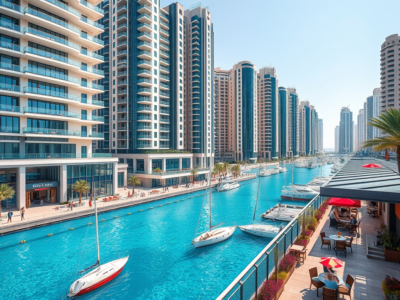Dubai’s property laws, particularly regarding inheritance and ownership, are crucial for both residents and expatriates interested in the real estate market. Understanding these regulations is vital to ensure legal compliance and secure property rights. This article explores the essentials of Dubai’s property laws, focusing on inheritance, ownership rights for expatriates, probate procedures, and tax implications. By the end, you will have a solid understanding of how these laws can affect property ownership.
Property Ownership in Dubai

In Dubai, property ownership is classified into several categories, primarily residential and commercial properties. The United Arab Emirates allows foreigners to own properties in designated areas, commonly referred to as freehold areas. This ownership structure provides expatriates with the right to buy, sell, and lease properties. Here are some important points regarding property ownership:
- Types of Property: Investors can acquire residential units, villas, apartments, and commercial real estate.
- Freehold vs. Leasehold: Freehold properties can be owned outright, whereas leasehold properties are held under a lease for a specified period.
- Ownership Restrictions: There may be specific restrictions on nationals of certain countries; therefore, it is essential to check compliance.
- Joint Ownership: Multiple owners can share a property, but this arrangement requires clear agreements on utilization and management.
- Investment Incentives: The Dubai government frequently introduces incentives for foreign investors, enhancing appeal.
Inheritance Laws for Property

Dubai’s inheritance laws are significantly influenced by Islamic law (Sharia), which applies to Muslims, while expatriates are often governed by their home countries’ laws. Understanding how inheritance works is essential for property owners to ensure smooth transitions of ownership after death. Key points include:
- Sharia Law Implications: Under Sharia, the distribution of property is predetermined, with specific shares designated for heirs such as spouses, children, and parents.
- Wills for Non-Muslims: Non-Muslims can draft a legally recognized will in Dubai to dictate the distribution of assets more freely.
- Executor Appointment: It is vital to appoint a trustworthy executor in your will to handle estate matters competently.
- Property Registration: All inherited properties must be registered with the Dubai Land Department to ensure proper legal title transfer.
- Respective Jurisdiction: Expatriates should consider their home country laws for inheritance in conjunction with UAE regulations.
The probate process in Dubai refers to the legal procedure through which a deceased person’s estate is administered. This procedure is essential to resolve any disputes and ensure that property is transferred according to the law. Here’s a breakdown of the probate process:
- Document Gathering: Collect necessary documents, including the death certificate, property titles, and will (if applicable).
- Court Application: Submit a formal application to the Dubai courts for probate; this may vary depending on whether it’s a Muslim or non-Muslim estate.
- Estate Valuation: An evaluation of the estate’s assets is required to determine its total value.
- Distribution of Assets: Once approved, the estate will be distributed to heirs as per the will or Sharia rules.
- Final Clearance: Upon distribution, the estate is cleared of debts and liabilities, and a final report is submitted to the court.
Tax Implications and Other Considerations
One of the advantages of owning property in Dubai is the absence of property taxes, which is a significant attraction for investors. However, there are other financial factors to consider:
- Registration Fees: Buyers must pay a registration fee (ranging from 2% to 4%) when purchasing property.
- Service Charges: Ongoing service charges for maintenance and management of communal facilities must be paid if you are in a planned community.
- Inheritance Tax: Dubai currently does not impose inheritance tax, but expatriates should verify their home country’s tax laws.
- Legal Fees: Hiring a lawyer to navigate the inheritance process or property dealings incurs additional fees.
- Insurance Considerations: Property owners should consider obtaining insurance to protect their investments and mitigate risks.
Conclusion
Understanding Dubai’s property laws concerning inheritance and ownership is essential for current and prospective property owners, particularly expatriates. Familiarity with these regulations can significantly ease the complexities surrounding property transactions and estate management. Ensuring you have outlined your wishes regarding inheritance effectively and have the necessary documentation in place will protect your assets. In addition, awareness of the financial obligations and legal frameworks will help create a smoother property ownership experience.
Frequently Asked Questions
1. Can expatriates own property in Dubai?
Yes, expatriates can own property in designated freehold areas within Dubai, subject to governmental regulations.
2. What happens to property when a non-Muslim dies in Dubai?
Non-Muslims can dictate the distribution of their property through a legally valid will; otherwise, Sharia law will apply.
3. Are there any inheritance taxes in Dubai?
No, Dubai does not impose any inheritance tax, but it is important to check your home country’s laws for any applicable taxes.
4. How long does the probate process take in Dubai?
The duration of the probate process varies based on the complexity of the estate and can take anywhere from a few weeks to several months.
5. Is it necessary to hire a lawyer for property transactions in Dubai?
While it is not mandatory, hiring a lawyer is highly recommended to navigate the legal complexities and ensure compliance with local laws.




